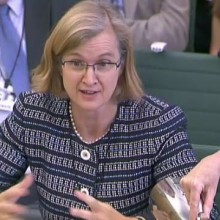Amanda Spielman, Chair of exam board regulator Ofqual, writes to SCHOOLS NorthEast after her visit to Newcastle.
Last Friday I came to Newcastle for the day, to meet the heads and senior leaders of schools in the SCHOOLS NorthEast group. This was my first visit to Newcastle for more than two decades, and it is striking how much the city has changed and developed since the 1980s.
I do spend quite a lot of time out visiting, as do many of my Ofqual colleagues. Inevitably we meet a lot of politicians but we also visit many schools and colleges. Unfortunately we can’t speak at every event we get invited to, nor can we visit every school. That is why we particularly welcome working with SCHOOLS NorthEast, which brings so many schools together and makes a single conversation out of many.
I came to Newcastle to explain what Ofqual does, and to answer some of the points raised in the recent SCHOOLS NorthEast Select Committee evidence, but most of all to listen to what schools have to say about exams and the exam system. We listen not simply so that we can ‘reply’ but so that we can think deeply about what feedback is telling us. We understand that every exam entry represents a student, someone who has worked hard with much help from their school to fulfil their potential. Every pupil matters. That means that every exam matters. And that means that the quality and integrity of the examinations system matters.
I heard about many different kinds of problem. Some were about exam papers and mark schemes that didn’t discriminate well enough; some about moderation; some about unsatisfactory marking; some about discrepancies between grades achieved in different units and in different subjects; and some about the wider perspective schools have on how the system functions.
It was very striking that all the main concerns expressed were about English, either GCSE or IGCSE. And they weren’t about one particular qualification: I heard four different concerns about four different qualifications. It was clear too that many other heads echoed one of these complaints. Some problems we knew about: for example, an IGCSE exam for which all the main grade boundaries fell in a very narrow mark band. Others we had not previously heard about.
Similarly, when I spoke to Cheshire East heads a couple of weeks ago, English was also at the top of their list: and again, there were concerns about a number of qualifications, rather than one particular qualification. We do need to look hard at what is happening across the whole English subject area.
A second point that really came across is that the post-16 GCSE resit requirement in English and maths has made the C/D boundary even more critical for students. This makes the timing of remarks in these subjects much more of an issue than before: up until now all A2 remarks have been prioritised over GCSEs, to make sure that university admissions are fair.
And a third big message for me is how strong the expectation now is that schools should set targets, predict outcomes against those targets, and deliver outcomes that closely match predictions. Students are now also more aware of individual targets and predictions than ever before, and correspondingly more disappointed if they fall even a single grade below what they had hoped for.
A fourth message is that you are finding it frustrating dealing with exam boards. The appeal processes don’t necessarily give satisfaction, and you are having to use them too much.
But the biggest message of all for me is that much of this feedback is reaching us too late, when you are already weary from pursuing individual and sometimes whole school cases with exam boards. Somehow we need to collect feedback earlier in the cycle so that we can respond knowledgeably and act sooner on systemic problems. One interesting suggestion, from the North East, was for Ofqual to set up a standing headteacher reference group. We also need to look more at how we get the right information into the public domain, in formats that are accessible and useful to schools.
In the light of this and much other feedback, we are very close to publishing a set of proposals on how the appeal system can be improved. You will see these in the next two weeks, and I hope to get some good SCHOOLS NorthEast feedback on them.
Finally, I was both intrigued and impressed by the SCHOOLS NorthEast model. It is an interesting concept with great potential. The level of engagement and support for schools within the region is clearly very high and it is great to see how SCHOOLS NorthEast is acting as a catalyst for change and a forum for constructive discussion. We hope to continue the conversation.
So many thanks to Mike Parker for organising the day, the heads on the panel and all who attended: your feedback is wanted and valued.
